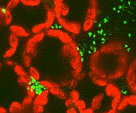Plant Pathology, Department of

Department of Plant Pathology: Faculty Publications
Document Type
Article
Date of this Version
8-13-2014
Citation
African Journal of Microbiology Research 8:33 (August 13, 2014), pp. 3094-3100.
doi: 10.5897/ AJMR2014.6941
Abstract
Black pod is a major hindrance to cocoa production in Nigeria. It is caused by three different Phytophthora species with Phytophthora megakarya as the most important species in Nigeria and West African subregion. Phytophthora spp. may enhance infections by opportunistic pathogens such as members of the Botryosphaeriacea that cause branch and trunk cankers in many woody plants across the world. Botryosphaeriacea has not been reported in cocoa nor in any woody plants in Nigeria to our knowledge. In the cocoa belt of Nigeria, research and understanding on cocoa black pod and Phytophthora is limited partly because of delayed or no access to some culture media, including required antibiotics. The objectives of this study were to: (1) use locally available materials to develop media for Phytophthora isolation from infected cocoa trees and pods samples and (2) to determine if members of Botryosphaeriaceae are associated with cankers of cocoa trees infected with black pod in Ondo State. The two formulated media, clarified tomato juice agar and cocoa pod agar supported the growth of Phytophthora spp. and were used for isolation from five cocoa- producing local government areas, spanning all three senatorial districts of Ondo State. Based on morphological characteristics, four different species of Botryosphaeriaceae were identified from infected cocoa trees/pods but also from citrus and kola trees, which are similar to cocoa and usually planted in the same orchard with cocoa in Nigeria. These findings of new pathogens in cocoa and other hosts in Ondo State indicated the need for new strategies in the management of cocoa diseases in the State and across cocoa-producing areas of Nigeria.


Comments
Copyright © 2014 Idowu Jaiyeola, Rufus J. Akinrinlola, Gbodope S. Ige, Oluwatimilehin O. Omoleye, Abiola Oyedele, Bayode J. Odunayo, Omotayo J. Emehin, Marcus O. Bello, and Anthony O. Adesemoye.
Creative Commons Attribution License 4.0 International License